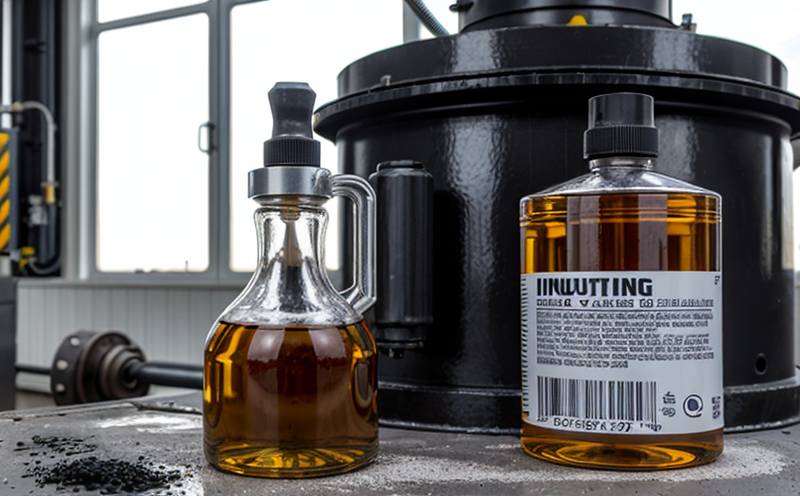GB T 8929 Density Testing of Industrial Oils
The density testing of industrial oils according to GB/T 8929 is a critical quality control procedure that ensures the consistency and reliability of lubricants used in various industrial applications. This standard, issued by the National Standardization Administration of China, provides detailed specifications for determining the density of petroleum products at specific temperatures.
The process involves precise measurements to ensure compliance with international standards, which is essential for maintaining the performance and longevity of machinery across different industries such as manufacturing, automotive, and aerospace. Understanding the principles behind this test will help quality managers, procurement officers, and R&D engineers make informed decisions regarding lubricant selection.
The testing procedure typically starts with proper sample preparation, ensuring that the oil is representative of the batch being tested. This involves degassing to remove any air bubbles that could interfere with accurate measurements. Once prepared, the sample is placed in a suitable container and allowed to stabilize at the required temperature. Temperature control is crucial as slight variations can significantly affect the density reading.
The most commonly used instruments for this test include digital densitometers or pycnometers. These devices measure the mass of a known volume of oil, providing accurate readings that adhere strictly to GB/T 8929. The standard specifies temperature conditions and procedures to minimize errors due to external factors.
The density value obtained from these tests is crucial because it influences several aspects of lubricant performance, including viscosity, film strength, and thermal stability. These properties are essential in preventing wear and tear on machinery components, reducing maintenance costs, and extending the operational life of equipment. Compliance with GB/T 8929 ensures that industrial oils meet stringent quality benchmarks, thereby enhancing overall productivity.
| Sample Preparation | Testing Procedure | Instruments Used |
|---|---|---|
| Degassing to remove air bubbles. | Measuring mass of a known volume at specified temperature. | Digital densitometer or pycnometer. |
Why It Matters
The importance of GB/T 8929 density testing cannot be overstated, as it directly impacts the operational efficiency and longevity of industrial machinery. Precision in this test ensures that lubricants are correctly formulated to support critical components under varying operating conditions.
Non-compliance with these standards can lead to premature wear, increased maintenance costs, and potentially hazardous failures. By adhering to GB/T 8929, manufacturers and end-users alike benefit from reliable performance data that helps in selecting the most appropriate lubricants for their specific needs.
Compliance also supports broader industry standards and contributes to the trustworthiness of manufacturing processes. For quality managers and procurement officers, this means they can rely on consistent product quality without the need for extensive quality checks downstream. R&D engineers can focus more on innovation knowing that fundamental parameters like density are accurately measured.
- Reduces wear and tear on machinery components.
- Enhances overall equipment efficiency.
- Promotes safer operating conditions.
- Supports broader industry standards.
Environmental and Sustainability Contributions
The density testing of industrial oils as per GB/T 8929 plays a key role in promoting environmental sustainability by ensuring that lubricants are correctly formulated to reduce waste and improve operational efficiency. Accurate density measurements contribute to the optimization of energy consumption, which is critical for reducing carbon footprints.
By selecting the right type of industrial oil based on its density, industries can minimize unnecessary usage, thereby conserving resources. This not only reduces costs but also supports global sustainability goals. The testing process itself is efficient and minimally disruptive to the environment, making it an ideal practice for responsible businesses.
- Minimizes waste by ensuring correct lubricant usage.
- Promotes energy efficiency through accurate formulation.
- Supports global sustainability goals.
- Makes the testing process efficient and environmentally friendly.
Use Cases and Application Examples
The GB/T 8929 density test is widely utilized in various industrial sectors, including manufacturing, automotive, aerospace, and power generation. This testing ensures that lubricants are appropriately selected to meet the specific requirements of different machinery types.
| Industry Sector | Machinery Type | Purpose of Density Testing |
|---|---|---|
| Manufacturing | Heavy machinery, conveyor systems | To ensure lubricants provide adequate film strength and reduce wear. |
| Automotive | Engine components, transmission units | To maintain optimal engine performance and fuel efficiency. |
| Aerospace | Jet engines, hydraulic systems | To ensure safety and reliability of critical components. |





